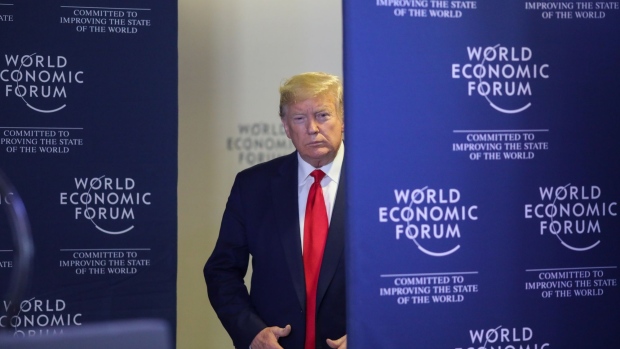Jan 24, 2020
Davos Sees Trump’s China Love as a Short-Term Affair
, Bloomberg News

(Bloomberg) -- Want to receive this post in your inbox every day? Sign up for the Terms of Trade newsletter, and follow Bloomberg Economics on Twitter for more.
Donald Trump tried hard to convince the world’s elite this week that he and Chinese President Xi Jinping have left their trade war behind them and they’ve moved on to a brighter future.
But many participants at the World Economic Forum in Davos, Switzerland, aren’t convinced that the U.S. president’s words here really translate to a declaration of peace.
On Tuesday, Trump acknowledged that the U.S.-China relationship “went through a very rough patch, but it’s never, ever been better.”
“My relationship with President Xi is an extraordinary one,” Trump told a packed auditorium in Davos. “He’s for China, I’m for the U.S. But other than that, we love each other.”
In private sessions, though, executives and scholars from both countries have expressed skepticism that a phase one trade agreement will be the end of this battle for economic, technological and military supremacy — and many believe that even with the partial deal in place, the U.S. will likely keep putting pressure on China on other fronts.
Commerce Secretary Wilbur Ross told Bloomberg Thursday that new rules to further choke off Huawei from U.S. suppliers are coming soon.
One person here described the U.S.-China relationship as an onion: Tariffs are the outer layer that’s been peeled off. What’s underneath is many more layers of policies like subsidies and technology issues that seem hard to reconcile. But the core of the onion is what really stands in the way of a positive trajectory, and that’s deep mistrust.
By now, the audience also knows that the president’s “love” for other leaders — including for Xi — is something that can change quickly.
“Trump also said he loves Kim Jong Un — he loves everyone,” said Dr. Yuan Ding, vice president and dean at the China Europe International Business School. “He kisses and then he curses.”
Charting the Trade War
The European Union and a group of 16 nations that includes China and Brazil are forming an alliance to settle their trade disputes using an appeals and arbitration system at the World Trade Organization to replace temporarily a process stymied by the U.S.
Today’s Must Reads
- Not so special | The so-called special relationship between the U.S. and Britain has been repeatedly tested this week — and the timing is sensitive, just as Boris Johnson and Trump prepare to negotiate a major new trade deal.
- Dumping dispute | The European Union ordered its customs officials to register flat-rolled stainless steel imports from China, Taiwan and Indonesia.
- Crop buster | Farmers’ euphoria over the U.S.-China trade deal is fading fast. The dispute with Washington has exposed Beijing’s vulnerability when it comes to food imports and China may now do all it can to wean itself off the U.S.
- Colombia rethink | For years, as China has spent heavily in Latin America, Colombia — Washington’s closest regional ally — has stood out as the major country with the smallest Chinese investment. That’s changing, and fast.
- The new world | Has globalization peaked? Business leaders, economists, and other experts give their views on the future of economic integration.
Economic Analysis
- VAT rules | The EU’s VAT e-commerce reform aims to facilitate cross-border trade, combat VAT fraud and ensure fair competition for the bloc’s businesses.
- Forced labor | U.S. Customs and Border Protection is investigating whether some goods from Xinjiang should be banned because they may have been produced by forced labor.
Coming Up
- Jan. 28: Swiss exports
- Jan. 29: U.S. advanced goods trade balance, Vietnam exports
- Jan. 30: Hong Kong exports
Like Terms of Trade?
Don’t keep it to yourself. Colleagues and friends can sign up here. We also publish Balance of Power, a daily briefing on the latest in global politics.
For even more: Subscribe to Bloomberg All Access for full global news coverage and two in-depth daily newsletters, The Bloomberg Open and The Bloomberg Close.
How are we doing? We want to hear what you think about this newsletter. Let our trade tsar know.
To contact the author of this story: Jenny Leonard in Washington at jleonard67@bloomberg.net
To contact the editor responsible for this story: Brendan Murray at brmurray@bloomberg.net, Zoe Schneeweiss
©2020 Bloomberg L.P.





